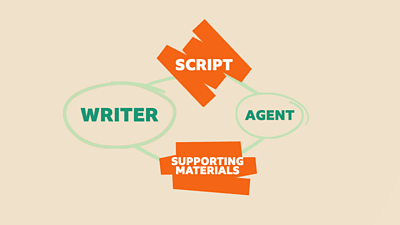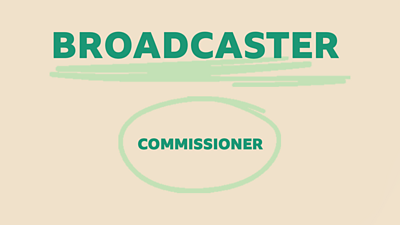The TV industry can be very confusing. For a writer it can feel overwhelming trying to figure out which hoops you need to jump through, and in which order, to get your script into production. You'll also stumble into a few industry-specific terms that might be new to you. Some are explained in this blog post, but if there's something you're not sure about, take a look at our Scriptwriting Glossary.
At 大象传媒 Writers, although we sit within the TV Drama Commissioning department, we don't commission or make TV programmes. This blog post is for writers who are keen to understand more about how to make their project into a reality. (For more about what we do and where we sit within all of this, check out How We Find and Develop Writers and Our place in the 大象传媒 and the television drama landscape.)
If you're a writer with a TV script that you want to get made, this is the first part of a whistle-stop tour of the important checkpoints along the way, and what you need to do to be in a good position to succeed.
Your Writing

This journey starts with you and your ideas. Before trying to catapult your project onto the big screen, you first want to ensure your ideas are demonstrated as best as they possibly can be on the page...
Click on each heading below to find out more information.
This needs to be the best it can be. It should be properly formatted, proof-read meticulously and represent the very best you have to offer.
See Getting your Screenplay ready to be submitted and Medium and Format
Assuming nobody has paid you to write your script and it hasn't been commissioned by a broadcaster, at this stage it will be considered a Spec Script. Short for 'speculative' script, this means you haven't been asked or paid to write it, but it is a calling card that communicates who you are as a writer. If you write in multiple different genres, you might want to have an additional spec script up your sleeve to demonstrate the different tones you're able to write. This would be especially useful when approaching an agent (if you don't have one already).
If you're writing a television series then in general your Spec Script will be for a Pilot episode (the first episode in the potential series). You wouldn't normally write the scripts for the remaining episodes unless you are paid to do so, however it is a good idea to put together a document demonstrating how you expect the series to continue (see below).
See What Makes a Great Spec Script for more advice on how to make your 'Spec' the best it can be.
Alongside your completed script, you should have a few extra things up your sleeve to demonstrate that you've really thought about your idea.
Logline
A one (sometimes two) sentence summary of your script or series. It captures all the key ingredients of your concept: Protagonist, Inciting Incident, Antagonist, World, Stakes. You should regard a logline as essential (we ask for one for every script submitted to our opportunities at 大象传媒 Writers). If you are struggling to come up with a good logline it could be an indicator that your story needs some more work.
For more on how to nail your logline, see Writing Loglines
One Page Pitch
Having a one-page pitch that contains all the key info about your idea: characters, story, world & tone, will be extremely useful to selling your idea. For some tips on how to work up this document, see The One Page Pitch.
See Treatments, Pitches, Outlines - What are they? for more information on the different forms of supplemental writing you'll want to think about. As Philip Shelley says in this blog post, they "are guaranteed to make even the steeliest writer’s heart sink a little. But as writers, you need to learn to embrace them, even if you can’t quite get to love them!"
Writing CV
It's worth keeping this up-to-date with any writing credits and projects you've produced, as well as relevant work experience or writing competitions you've been successful in.
What Is An Agent?
An agent's main job is to get you writing work, guide your career and get your scripts in the hands of people who can give you professional opportunities. Agents also handle legal matters and financial negotiations on your behalf.
Do I Need One?
Given that most production companies don’t accept unsolicited scripts, having an agent is going to be your best shot at having your script taken seriously. Most agents want to take on people who already have momentum and achievements under their belt. If you’re very early in your career, you’ll probably need to bring some projects to fruition by yourself or accrue recognition for your writing via writing competitions etc, before agents take interest. This is one of the points where being part of a 大象传媒 Writers development programme can help your career.
How Do I Get One?
Make sure your script is the best it can be and your efforts so far are impressive, and start emailing. See here for some more detail on how to reach out...
Production Company

The production company - which you may also hear referred to as an 'indie' - is the vehicle which will (hopefully) end up physically turning your script into the real thing. As a writer, you can鈥檛 go straight to a broadcaster on your own, and will need the support and infrastructure of a production company to put up a convincing pitch to commissioners.
Most indies don鈥檛 accept unsolicited scripts, and if they don鈥檛, you should not approach them directly - this is a conversation for your agent to have. Some indies will have an open submissions inbox which you can submit directly to as a writer. If approaching this way, be sure to read any submission guidelines they provide before cold emailing, as they often specify exactly what they want to see from writers.
Production companies greatly vary in size, from small start-up indies to major operations. Within the production company there can be a lot of personnel and job roles, but there's one team you'll want to make a good impression on first...
The development team are the people within a production company whose job it is to find new projects and get them in shape for a pitch to a broadcaster.
Depending on the size of the production company, this could be a large team with several different job roles, or just one person.
The likelihood is that a development producer will be your way in. Development producers find scripts and prepare them for TV or film production, providing feedback on your script and working with you to turn the script into a viable broadcast proposition. Your first contact with a development producer is likely to be through a general meeting, often after they have read your spec script. This meeting is an opportunity for them to find out more about you and the ideas that you are passionate to write about. Although your spec script probably got you into the meeting, be prepared to talk about other ideas and projects that you are working on.
At this point the Production Company will decide whether they want to take an on your script and from now on any work you do on it (or the supporting documents eg treatment, outline etc) will be paid. Again, this is where it is useful if you have an agent as they will negotiate terms on your behalf. There is also help and resources available on the .
It's worth warning you now that even though this stage only takes up a few sentences of this blog post, the whole development process can take years. Be prepared for a lot of back-and-forth and a lot of potential redrafts, with no guarantee of a commission at the end of it. Even in a best-case scenario there is no overnight success - treat this as a marathon, not a sprint!
Your Pitch

Once everyone working on your project feels it鈥檚 ready to be pitched to a broadcaster, the indie will assemble all the relevant materials and information and take it to broadcasters for their consideration. This may include proposals of people to be involved, such as attaching a director or casting for key roles.
Another word of warning here, as a lot of writers are keen to direct their own work or step into roles like Executive Producer. While some indies are happy to be collaborative with writers on creative decisions, do not assume that will be the case. If you're a newcomer to writing for TV, you're unlikely to be given the level of creative influence of an 'auteur' writer-director, so be realistic in your expectations and be prepared at this stage for your role to be as writer and writer only.
It's also worth reiterating that television is a very collaborative industry. You need to be prepared to deal with feedback and notes from many people during this process and your ability to respond to and react to this advice positively will have an effect on the likelihood of a successful outcome and whether people want to support you and your work on an ongoing basis.
The Broadcaster

The broadcaster is ultimately the company that gives the thumbs up and puts forward the money to get a script made. This could be a traditionally linear TV broadcaster which broadcasts on-air channels alongside their streaming services - like the 大象传媒, ITV or Channels 4 and 5 - or a streaming-only platform like Netflix, Amazon Prime or Apple TV.
Broadcasters have a lot of staff, but for the purposes of getting your pitch over the line there is one crucial person you need to impress...
A Commissioner (or Commissioning Editor) is the person working for the broadcaster who reviews pitches and decides whether your programme gets onto their development slate and ultimately whether it will get made. They provide feedback during development, and if a project is given a commissioning greenlight (ie it will go into production) they help steer the project to delivery, influencing key decisions and ensuring it’s delivered on time and within budget.
Depending on the broadcaster and commissioning structure, your pitch might be read by a commissioning assistant or commissioning co-ordinator before being referred up for a decision.
Your first commission and beyond...
If you've made it this far in the process, congratulations! Your project is well on its way to becoming a reality.
To find out more about the next stage of the journey of your script check out Part Two of this series of blog posts - The TV Drama Commissioning Slate.
As a new writer, the journey to your first TV commission will be long and will have no shortage of frustrations and knock-backs along the way. Be persistent, be patient, and make sure you stay inspired - after all, this all starts with you and the ideas you believe in.

